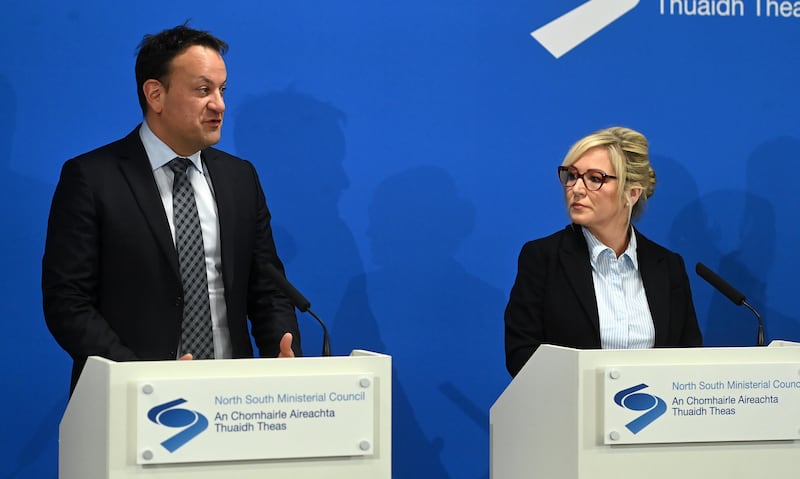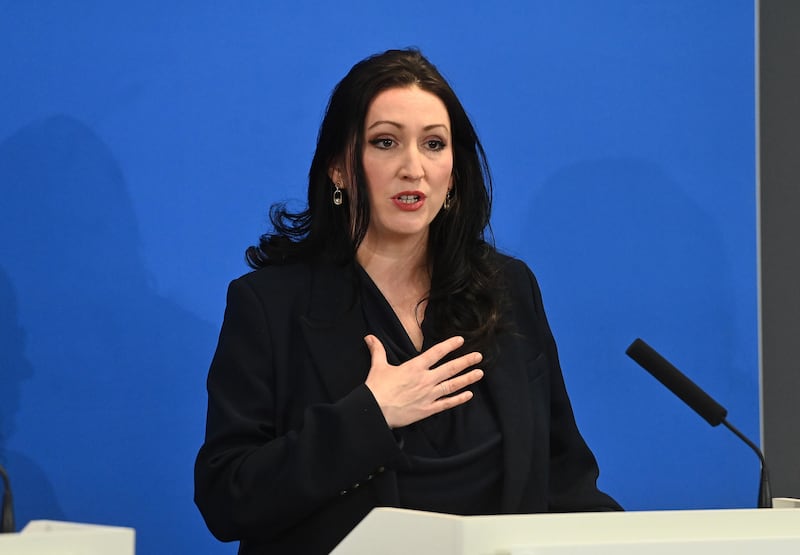Leo Varadkar has expressed hope that negative perceptions of him among some unionists will be reassessed in the future.
The outgoing Taoiseach was often portrayed within sections of the unionist community as a divisive figure during the Brexit process, amid claims his drive to prevent a hard border on the island of Ireland ultimately led to the EU and UK agreeing trading arrangements that created economic barriers between Northern Ireland and the rest of the UK.
Mr Varadkar was asked about the hostility he provoked among some unionists and loyalists as he attended his final engagement as Taoiseach north of the border.

Speaking to reporters at the end of the North South Ministerial Council in Armagh, only hours before formally stepping down from office, the former Fine Gael leader acknowledged the turbulence generated during the Brexit negotiations.
- Micheal Martin said he is pursuing Google ads case ‘for the public good’Opens in new window
- Sean Brown murder: Taoiseach Leo Varadkar highlights need for ‘human rights compliant’ legacy processesOpens in new window
- Republican prisoners’ group delegation visits European Parliament in BrusselsOpens in new window
Asked if he thought unionist criticism of him was fair, he said: “I would hope perhaps in a few years’ time, with the fullness of time, when things look a bit different, with hindsight, that might be reassessed.
“You know, certainly Brexit, the decision of the UK to leave the European Union, was very disruptive. And I spent a huge amount of my time as Taoiseach trying to make sure that it didn’t create a hard border between north and south and didn’t adversely affect Ireland’s position in the European Union.
“And that did take a lot of work. Ultimately it required three different agreements to be negotiated with the UK government, all of which were negotiated while I held office as Taoiseach.
“And we now have one (Windsor Framework) that I think is going to hold and (it is) important now that we make things work and that we try to make sure that we have a good and close relationship with Britain into the future and that, as much as possible, whoever holds the office of Taoiseach or whoever serves in the Irish government tries to reach out to all communities in Northern Ireland.”
DUP deputy First Minister Emma Little Pengelly, who also attended the meeting in Armagh, spoke of the past tensions.
“I think the Taoiseach is well aware that relationships between ourselves in the DUP and the Taoiseach, (and) with unionism in general, has been difficult in the past,” she said.
“I’ve no doubt that I have personally criticised the Taoiseach on the record in the past as well.
“But, as I’ve said, I wish the Taoiseach all the best in his steps ahead.
“And, of course, I am a unionist, I’m a very passionate unionist, my interest is in strengthening the United Kingdom.
“But…I want to be in this role, and in any role that I play, a good neighbour. I want there to be good relationships with the Republic of Ireland.
“That is what I will be moving forward to try to establish. Of course there are areas of mutual concern but my focus first and absolutely is to be a champion for Northern Ireland and to strengthen this union of the United Kingdom.”

Ireland’s deputy premier Tanaiste Micheal Martin paid tribute to Mr Varadkar’s contribution.
“(I want to) take the opportunity to thank the Taoiseach for his contribution to politics and particularly to the north south agenda,” he said.
“There will always be agreements and disagreements and there have been many over the 25 years of the Good Friday Agreement but I think the key point is commitment and a sense of public service in the discharge of one’s duties.
“And I think the Taoiseach did that commendably over his time as Taoiseach and as a minister in the context of the North South Ministerial Council, and I want to put that on the record publicly to thank him for that.”
Last month, Mr Martin criticised comments made by Stormont First Minister Michelle O’Neill on the resignation of Mr Varadkar.
He branded the Sinn Fein vice president’s remarks “very partisan” and said they “left a lot to be desired”.
That came after Ms O’Neill accused Mr Varadkar’s party Fine Gael of 13 years of “failure” as she insisted it was time for a general election in the Republic of Ireland.
Ms O’Neill did not repeat that criticism as she commented on the Taoiseach’s departure following the NSMC meeting in Armagh.
“I want to wish you the very best personally for whatever comes next in your life’s journey, the very best to you and to your family,” she told Mr Varadkar.
“And I think that was universally expressed in the North South Ministerial Council meeting itself.”
Ms O’Neill added: “I think just in terms of the Brexit debate, the last number of years that’s been very complicated, it’s been very challenging at times.
“But I also think it’s right to recognise that my political aspirations and Emma’s are different, but this goes right to the heart of the Good Friday Agreement, this is what making politics in the north is all about and if we can’t respect our differences of approach, that’s a problem, because that’s what the Good Friday Agreement speaks to.
“I am determined to do that. I think we can confidently govern together whilst we also look towards the future and where we want this place to go.
“So I want to commend the work that’s been done with the Irish government over many, many years of the Brexit ups and downs. I think it’s been hugely, hugely challenging.
“I’m glad we all are where we are today and I’m glad that we are in a situation where we now have an opportunity, an economic opportunity, to speak about, and we need, in Executive terms, need to work together to ensure that we maximise that opportunity that we now have.”







